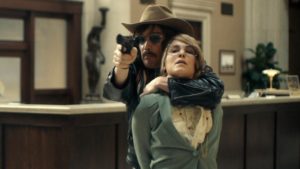In the summer of 1973, a convict, fresh off parole, entered one of Sweden’s largest banks and took four employees hostage for six days in a bungled robbery. Director Robert Budreau’s re-imagining of the infamous event casts Ethan Hawke as Lars Nystrom, a raucous walking American stereotype who marches into Kreditbanken like a hurricane of cheap beer and Texan twang. It isn’t long before the hostages begin to side with our swashbuckling protagonist (and the term “Stockholm syndrome” was born).
Nystrom immediately demands $1 million and the release of his old partner in crime, Sweden’s most notorious bank robber Gunnar Sorenson (Mark Strong). Hilarity ensues as Bob Dylan blares and the cribbage boards come out, turning the lobby of the grand establishment into a Marlborough-hazed casino. Hard to imagine that a romance could blossom under these circumstances, yet Budreau tries his hardest to convince us.
Noomi Rapace portrays Bianca Lind, a doe-eyed beauty who seems to sense a softer side to her captor. She embodies the sentiment of the Vietnam era, working for the establishment while simultaneously skeptical of its protection. The outside world has little she longs for aside from her children; in one touching scene, she describes to her husband exactly how to prepare fish for her picky daughter. Instead they eat meatloaf, to her disappointment.
Stockholm, while having the talent to entertain us, lacks the connective tissue that makes this story interesting. The psychology of how morality evolves and how sympathy manifests in the face of danger is the real substance and yet Budreau’s film wants us to chuckle our way past these omissions. The film shows the length Lind will go to remain in limbo, but by the time we get to her conjugal visit with the man that nearly killed her, we still have no idea what is motivating her.

